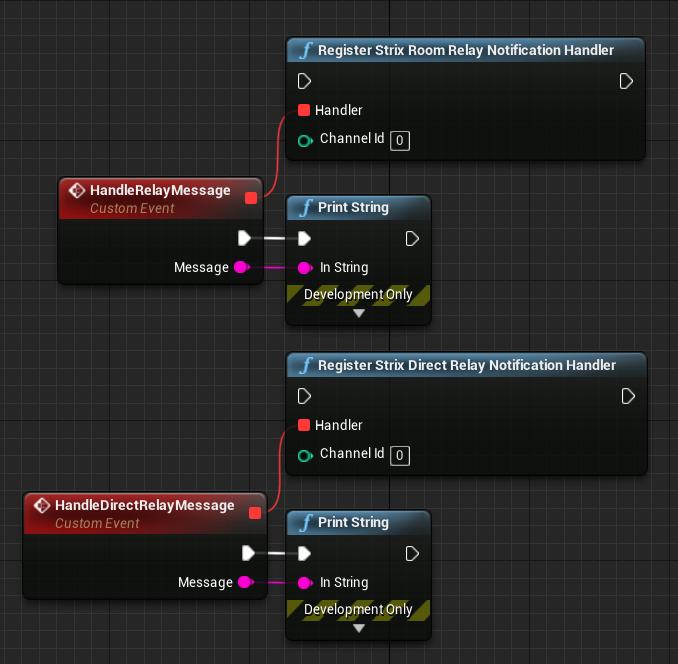핸들러 등록¶
참고
다음은 고급 기능으로, 플러그인의 C++ 소스 코드 편집이 필요합니다.
Strix는 현재 메시지 릴레이 목적의 범용 핸들러가 없습니다. 따라서 이것은 커스텀 구현으로 처리해야 합니다.
다음 샘플 구현에서는 새 함수 두 가지를 StrixBlueprintFunctionLibrary에 추가하고, 라이브러리가 이용하는 StrixNetworkFacade에 추가합니다. 이 함수들은 방과 직접 릴레이 메시지 각각에 핸들러로 블루프린트 함수를 등록하는 것이 목적입니다.
이 메서드는 대부분 변경할 필요가 없습니다. 한 가지 유의할 점은 릴레이 메시지가 서로 타입이 다를 수 있다는 것입니다. 따라서, 아래 마지막 두 함수의 개체 변환 단계는 해당하는 타입으로 바꿔 줘야 합니다.
함수 설정¶
// StrixBlueprintFunctionLibrary.h
/** Registers a handler to call when a Relay is received
* @param handler The callback to call when notification received
* @param channelId The channel to listen on
*/
UFUNCTION(BlueprintCallable, Category = "StrixBPLibrary", meta = (WorldContext = "WorldContextObject"))
static void RegisterStrixRoomRelayNotificationHandler(const UObject * WorldContextObject, const FStrixRoomRelayNotificationDelegate& handler, int32 channelId);
/** Registers a handler to call when a direct Relay is received
* @param handler The callback to call when notification received
* @param channelId The channel to listen on
*/
UFUNCTION(BlueprintCallable, Category = "StrixBPLibrary", meta = (WorldContext = "WorldContextObject"))
static void RegisterStrixDirectRelayNotificationHandler(const UObject * WorldContextObject, const FStrixDirectRelayNotificationDelegate& handler, int32 channelId);
// StrixBlueprintFunctionLibrary.cpp
void UStrixBlueprintFunctionLibrary::RegisterStrixRoomRelayNotificationHandler(const UObject * WorldContextObject, const FStrixRoomRelayNotificationDelegate& handler, int32 channelId)
{
// Get the network facade
UStrixNetworkFacade* strixNetwork = UStrixNetworkFacade::GetInstance(WorldContextObject);
// Check it exists
if (!strixNetwork)
{
UE_LOG(LogStrix, Log, TEXT("StrixBlueprintFunctionLibrary::RegisterStrixRoomRelayNotificationHandler - Strix network is not initialized."));
return;
}
// Call the register function
strixNetwork->RegisterRelayNotificationHandler(handler, channelId);
}
void UStrixBlueprintFunctionLibrary::RegisterStrixDirectRelayNotificationHandler(const UObject * WorldContextObject, const FStrixDirectRelayNotificationDelegate& handler, int32 channelId)
{
// Get the network facade
UStrixNetworkFacade* strixNetwork = UStrixNetworkFacade::GetInstance(WorldContextObject);
// Check it exists
if (!strixNetwork)
{
UE_LOG(LogStrix, Log, TEXT("StrixBlueprintFunctionLibrary::RegisterStrixRoomRelayNotificationHandler - Strix network is not initialized."));
return;
}
// Call the register function
strixNetwork->RegisterDirectRelayNotificationHandler(handler, channelId);
}
// StrixNetworkFacade.h
/** Registers a handler to call when a Relay is received
* @param handler The callback to call when notification received
* @param channelId The channel to listen on
*/
void RegisterRelayNotificationHandler(const FStrixRoomRelayNotificationDelegate& handler, int32 channelId);
/** Registers a handler to call when a direct Relay is received
* @param handler The callback to call when notification received
* @param channelId The channel to listen on
*/
void RegisterDirectRelayNotificationHandler(const FStrixDirectRelayNotificationDelegate& handler, int32 channelId);
핸들러 등록하기¶
// StrixNetworkFacade.cpp
// Register Relay handler
void UStrixNetworkFacade::RegisterRelayNotificationHandler(const FStrixRoomRelayNotificationDelegate& handler, int32 channelId)
{
// Get the room context for this channel. This represents the room connection on the client side.
auto context = m_roomContextsByChannelId.find(channelId);
if (context != m_roomContextsByChannelId.end())
{
// Get the match room client. This is what the handler will be added to.
auto matchRoomClient = context->second->GetMatchRoomClient();
if (matchRoomClient)
{
// Add the room Relay notification handler. This takes a lambda function to call when a message is received.
// The lambda itself takes a NotificationEventArgs<RoomRelayNotificationPtr> type which contains the message.
matchRoomClient->AddRoomRelayNotifiedHandler([=](strix::client::core::NotificationEventArgs<strix::client::room::message::RoomRelayNotificationPtr> args)
{
// Get the message that was sent.
auto message = args.m_data->GetMessageToRelay();
// In this case, the message contains an FString.
// The conversion is undertaken by the ConvertObjectToValue<FString> templated function.
FString messageText = strix::client::core::util::ObjectConverter::ConvertObjectToValue<FString>(message);
// Execute the handler.
// The handler is set in the Blueprint as a function.
handler.ExecuteIfBound(messageText);
});
}
}
}
void UStrixNetworkFacade::RegisterDirectRelayNotificationHandler(const FStrixDirectRelayNotificationDelegate& handler, int32 channelId)
{
// Get the room context for this channel. This represents the room connection on the client side.
auto context = m_roomContextsByChannelId.find(channelId);
if (context != m_roomContextsByChannelId.end())
{
// Get the match room client. This is what the handler will be added to.
auto matchRoomClient = context->second->GetMatchRoomClient();
if (matchRoomClient)
{
// Add the room Relay notification handler. This takes a lambda function to call when a message is received.
// The lambda itself takes a NotificationEventArgs<RoomDirectRelayNotificationPtr> type which contains the message.
matchRoomClient->AddRoomDirectRelayNotifiedHandler([=](strix::client::core::NotificationEventArgs<strix::client::room::message::RoomDirectRelayNotificationPtr> args)
{
// Get the message that was sent.
auto message = args.m_data->GetMessageToRelay();
// In this case, the message contains an FString.
// The conversion is undertaken by the ConvertObjectToValue<FString> templated function.
FString messageText = strix::client::core::util::ObjectConverter::ConvertObjectToValue<FString>(message);
// Execute the handler.
// The handler is set in the Blueprint as a function.
handler.ExecuteIfBound(messageText);
});
}
}
}
용도¶
